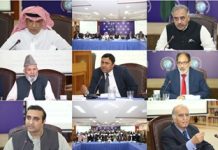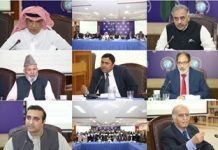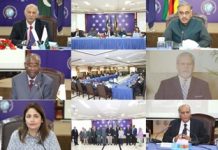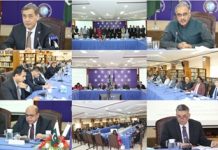PRESS RELEASE
Centre for Afghanistan, Middle East & Africa (CAMEA)
in collaboration with
Rasanah International Institute for Iranian Studies (Rasanah IIIS)
Webinar
48th OIC CFM : An Assessment
March 29, 2021
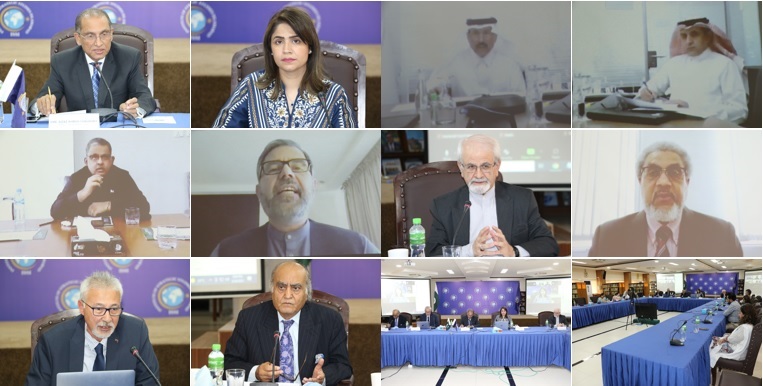
The Centre for Afghanistan, Middle East and Africa (CAMEA) at the Institute of Strategic Studies (ISSI) organized a webinar on “48th OIC CFM : An Assessment ”, in collaboration with the Rasanah International Institute for Iranian Studies (Rasanah IIIS) today. The speakers included Maj. Gen Ahmed Almaimouni, Research & Studies Center Director at Rasanah IIIS; Ambassador Rizwan Sheikh, Pakistan’s Permanent Representative to the OIC; Ambassador Ali Awadh Asseri, Former Ambassador of Saudi Arabia to Pakistan; Sardar Nadir Naim, Chairman Kabul Institute for Peace (KIP); Dr. Kazem Sajjadpour, Distinguished Fellow IPIS; Dr. Daud Abdullah, Director Middle East Monitor (MEMO); General Levent Gozkaya, Former Turkish Commander of Kabul Regional Command; Ambassador Aizaz Ahmad Chaudhry, Director General ISSI; Ambassador Khalid Mahmood, Chairman BOG ISSI and Ms. Amina Khan, Director CAMEA, ISSI.
During her introductory remarks Amina Khan stated over the years, Pakistan has been closely engaged in supporting cooperation amongst member states and advocating for equitable solutions for various issues faced by the Muslim community. Pakistan has presently been very proactive in pursuing a crusade against Islamophobia, and as a result of Pakistan’s efforts, the UNGA has declared March 15 as the international day to combat Islamophobia. Pakistan is a firm believer in the potential of the OIC and an advocate and supporter of the need for a collective approach in the face of ongoing challenges facing the Miuslim Ummah. In this backdrop today we are gathered here to discuss the outcomes of the OIC CFM moot as well as reinforcing the commitment and cooperation between the member states. The Muslim world is confronted with so many challenges and post 48th CFM, it is important to get perspectives from different parts of the Muslim world. In this regard, we are having speakers from Turkey, Iran, Afghanistan and Pakistan as well, she concluded.
During his welcome remarks Ambassador Aizaz Ahmad Chaudhry stated that the recent 48th OIC CFM signifies Pakistan’s deep attachment to Muslim causes, and it also coincided with Pakistan’s 75th Anniversary. Pakistan is always a proud host of its fellow Muslim delegates. Like always the OIC expressed full solidarity wirth Jammu and Kashmir , Palestine and Afghanistan as well as various Muslim countries suffering turmoil. He said Islamophobia has emerged as a major theme and has captured world attention with the passing of the UNGA resolution. This is one area where all Muslim countries can join hands. The theme of the Islamabad meeting was very important because it shows how possible it will be to empower the OIC in the future. If Muslims really want to be heard, they have to stand together and support principles of interstate conduct and development. In this day and age, economic security has emerged as a dominant theme for national as well as international security. If we are able to use the OIC paraphernalia and focus more on boosting economic and commercial cooperation between Muslim states this willl help the OIC become more relevant in the future, he concluded.
Maj. Gen Ahmed Almaimouni said that the OIC is an important organization for Muslim unity. It signifies the brotherhood and strong bond among the member countries of this OIC. This OIC moot was a reverberating success. He commended Pakistan’s efforts towards the UNGA resolution on Islamophobia. He stressed that the OIC will have to rise to Muslim expectaions and can play a crucial role in unifying the Muslim bloc.
Ambassador Asseri congratulated the Pakistan government for the positive outcome of the 48th OIC CFM moot. Such an important meeting in Islamabad reflects Pakistan’s efforts and importance in unifying the Muslim Ummah. The presence of China for the first time signals that China wants to solidify its relations with the Mulsim World. He appreciated different initiatives taken by the OIC, including the ongoing crisis in Ukraine as well as the humanitarian crisis in Afghanistan and the rising issue of Islamophobia around the world. He hoped that there is a followup OIC subcommittee to make sure that whatever has been agreed upon with respect to Afghanistan will be implemented.
Ambassador Rizwan Saeed Shiekh stated that the 48th OIC CFM was a resounding success and was better than expected. A variety of areas including new ones were strongly addressed. He said the OIC has a good scorecard on Kashmir and through this meet Pakistan got a plan of action on Kashmir. He outlined that the Human Rights Council is supposed to catalog different human rights issues and see how they are violated. In this regard, the OIC has also been asked to review the situation in Jammu and Kashmir. He said that Islamophobia was addressed strongly and the Secretary General has been asked to assign a special envoy on Islamophobia as well. On China’s presence in the moot he stated that China and OIC should look for avenues to work together. In the context of geography, trade preferential agreements are the best ways to go forward.
Sardar Nadir Naim said that Afghanistan has suffered for over four decades and Afghans have stood against foreign invasions. Afghanistan has stood against big powers and the consequences for the country have been devastating. There is a financial crisis and the situation could lead to a civil war. The Afghan economy has been dependent on foreign aid and a stop to this has also contributed to the humanitarian crisis. The restrictions on banks have led to the liquidity crisis and the aid coming in very slowly and people are suffering. With hindsight, we must ensure that the country should not fall into the hands of terrorists. Therefore some of the issues that need to be seriously addressed; which include, prevention of state failure and the continuation of aid flow without discontinuation, removal of sanctions – which are hurting the Afghan people the most- and the unfreezing of Afghanistan’s assets. Apart from these, there is a mutually agreed mapping for a road to political recognition regionally and internationally. The concept of setting up a trust fund is a good start and is promising. The OIC can have a much greater role in the Islamic world and beyond, he concluded.
Dr Sajjadpour said, that the of OIC is an asset as a concept of cooperartion among Muslim countries and must be preserved. This multilateral institution is an international tool for all Muslim countries. The by-products of OIC should be appreciated. These include creating a space barring all differences between countries. Furthermore, he highlighted how there is an OIC identity which is very significant especially in places such as New York and Geneva. He said OIC creates sensitivity, evidenced by the UNGA resolution on Islamophobia. If Muslim countries want to preserve this assest , they need to be more universal to the sensitivities of all Muslim countries not just a select few. OIC should not be a monopoly of some countries. He also cautioned that there should also not be over-expectations from the OIC.
Dr Daud Abdullah said that the decision of the OIC to appoint different envoys is good but a lot more needs to be done. The ongoing conflicts from Libya to Mozambique need to be addressed. There are several challenges and there is also a lack of funding and all conflict areas must be looked at. On the question of Islamophobia, it is worth congratulating OIC on getting the resolution passed and it is a great achievement after years of hard work. The EU did not support this resolution and this shows the magnanimity of the problem. The Palestinian Refugee issues remain unresolved and there is concerted effort on part of Israel to dismantle the UNRWA ( United Nations Relief Works Agency). The OIC must ensure that this must not happen and UNRWA must be preserved and donor countries in Europe want to impose restrictions. The OIC must be cognizant of this. He also talked about the issue of normalizing relations with Israel. He pointed out how Israel today is recognised by many countries as well as human rights organizations as an aparthied entity. Hence, the OIC, going forward should pressurize the UN as designating Israel as an aparthied state. It is a challenge which no single country can accomplish on its own but collectively the OIC will be able to achieve not just for Palesitne but humanity as whole, he concluded.
General Levent said that the OIC can play a lead role to direct its member states. We must fight Islamophobia. We have to fight together for this issue. Muslim unity is needed to deal with such issues. The OIC can play a lead role to direct its members and politicians to play a role in combating Islamophobia.
Ambassador Khalid Mahmood said that the 48th OIC CFM was indeed a resounding success and effectively addressed the theme of the meeting. The CFM adressed the main issues affecting the Muslim Ummah such as Palestine, Afghanistan and Kashmir. It also addressed the burning issue of Islamophobia. However, he said this is not enough. Even though there are a number of resolutions but very few are implemented.There is a need for consistency of approach. He said that though the moot was dominated by the security and stability issues, other issues of economics and culture were not addressed. The OIC is an asset we should preserve to get maximum benefits. Islamic countries should sit together in Geneva to convey the message of Muslim unity and in order to get a resolution passed on the humanitarian issues in the Mulsim World. He also said that Pakistan’s role is very crucial and it must play a proactive role because it is an opportunity for Pakistan to prove itself.




